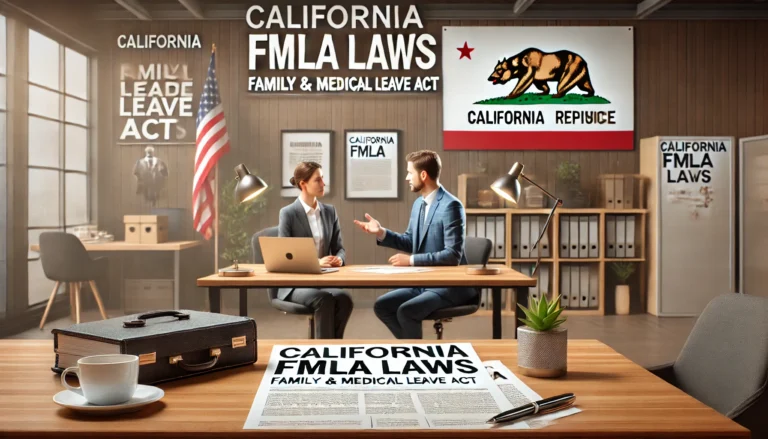Balancing your work life and your personal life can be complex and challenging. It can be increasingly challenging when personal responsibilities start to interfere with your work, such as health or family matters. Recognizing this, federal and state laws in the U.S. help provide employees with the right to take job-protected leave for qualifying family or medical reasons. While this is a legal right for all employees, some employers retaliate against their employees for taking leave by wrongfully terminating or harassing them.
Understanding your rights under the Family and Medical Leave Act (FMLA) and the California Family Rights Act (CFRA) is a crucial step to combating workplace retaliation and getting peace of mind. If you believe you are being retaliated against for taking leave, speak to a Los Angeles workplace retaliation attorney to help fight for your rights in the workplace.
What Is Covered Under FMLA and CFRA?
The Family and Medical Leave Act (FMLA) is a federal law that entitles eligible employees to take up to 12 weeks of unpaid, job-protected leave within a 12-month period. This leave can be used for:
- The birth, adoption, or foster care placement of a child.
- Caring for a spouse, child, or parent with a serious health condition.
- Attending to the employee’s own serious health condition.
- Certain qualifying exigencies related to a family member’s military service.
In California, the state-level California Family Rights Act (CFRA) complements FMLA, offering similar protections with some distinctions. For instance, CFRA includes domestic partners in the list of family members for whom employees can take leave, and the definition of “serious health condition” may differ slightly. Importantly, both laws ensure employees can return to their job or an equivalent position after leave and protect against retaliation for taking leave.
What Is Retaliation?
Retaliation occurs when an employer takes adverse actions against an employee for asserting their legal rights, such as taking FMLA or CFRA leave. Adverse actions can include:
- Demotions or pay cuts.
- Negative performance reviews or unwarranted discipline.
- Reassignment to undesirable tasks or shifts.
- Termination of employment.
These actions become retaliation when they are directly linked to the employee’s decision to take leave.
How FMLA and CFRA Protect You From Retaliation
Both FMLA and CFRA contain anti-retaliation provisions, making it unlawful for employers to punish employees for requesting or taking family or medical leave. Under these laws, employers cannot:
- Deny an eligible employee’s request for leave.
- Threaten or intimidate employees to deter them from taking leave.
- Use an employee’s decision to take leave as a factor in employment decisions, such as promotions, raises, or terminations.
For example, if you take leave to care for a sick family member and return to find that your role has been eliminated or your responsibilities have been significantly reduced, this could constitute retaliation.
What to Do If You Experience Retaliation
If you believe you have been retaliated against for taking FMLA or CFRA leave, it’s important to act quickly to protect your rights. Here are some steps to take:
- Document Everything: Keep detailed records of your leave request, communications with your employer, and any changes to your job or treatment after taking leave. Written documentation is critical in building your case.
- Review Your Rights: Familiarize yourself with the specific protections provided by FMLA and CFRA. An attorney specializing in employment law can help you interpret how these laws apply to your situation.
- Report the Retaliation: File a complaint with your company’s HR department. Many organizations have internal grievance processes that can address retaliation.
- File a Complaint: If your employer does not resolve the issue internally, you can file a complaint with the U.S. Department of Labor for FMLA violations or with California’s Civil Rights Department (formerly DFEH) for CFRA violations.
- Seek Legal Counsel: Retaliation claims can be complex, and an employment lawyer can help you understand your options and represent your interests if legal action becomes necessary.
Preventing Retaliation: What Employers Should Know
Employers also have a responsibility to prevent retaliation and foster a workplace that respects employees’ legal rights. This includes:
- Training managers and HR professionals about FMLA and CFRA requirements.
- Creating clear leave policies that comply with federal and state laws.
- Ensuring open communication with employees taking leave.
When employers create an environment of understanding and respect, they not only comply with the law but also promote employee well-being and trust.
Key Takeaways
Taking family or medical leave is a right, not a privilege. FMLA and CFRA exist to ensure employees can tend to critical personal and family needs without fear of losing their job or facing retaliation. If you experience retaliation for exercising these rights, you are not alone—laws are in place to protect you. By standing up for your rights, documenting incidents, and seeking support from the proper channels, you can take the necessary steps to hold your employer accountable and secure the protections you deserve.

